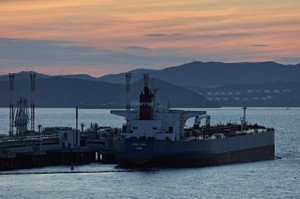Oil prices remain near four-month highs as markets weigh Russia sanctions impact
Published by Global Banking & Finance Review®
Posted on January 14, 2025
2 min readLast updated: January 27, 2026

Published by Global Banking & Finance Review®
Posted on January 14, 2025
2 min readLast updated: January 27, 2026

Oil prices slipped as U.S. forecasts steady demand, while new sanctions on Russian exports limited declines. Brent and WTI crude prices fell, with market focus on supply predictions.
By Erwin Seba
HOUSTON (Reuters) -Oil prices slipped on Tuesday after a U.S. government agency forecast steady U.S. oil demand in 2025 while lifting its forecast for supply.
Declines were limited by new U.S. sanctions on Russian oil exports to India and China.
Brent futures fell $1.09, or 1.35%, to settle at $79.92 a barrel. U.S. West Texas Intermediate (WTI) crude finished at $77.50 a barrel, down $1.32, or 1.67%.
On Monday, prices jumped 2% after the U.S. Treasury Department on Friday imposed sanctions on Gazprom Neft and Surgutneftegas as well as 183 vessels that transport oil as part of Russia's so-called shadow fleet of tankers.
On Tuesday, the U.S. Energy Information Administration said the country's oil demand would remain steady at 20.5 million barrels per day (bpd) in 2025 and 2026, with domestic oil output rising to 13.55 million bpd, an increase from the agency's previous forecast of 13.52 million bpd for this year.
Phil Flynn, senior analyst with Price Futures Group, said markets were anticipating the EIA short-term energy outlook to see if a predicted gain in supply would be reversed.
"They're waiting to see if the glut EIA predicted earlier is still in the forecast," Flynn said.
While analysts were still expecting a significant price impact on Russian oil supplies from the fresh sanctions, their effect on the physical market could be less pronounced than what the affected volumes might suggest.
ING analysts estimated the new sanctions had the potential to erase the entire 700,000-bpd surplus they had forecast for this year, but said the real impact could be lower.
"The actual reduction in flows will likely be less, as Russia and buyers find ways around these sanctions," they said in a note.
Uncertainty about demand from major buyer China could blunt the impact of the tighter supply. China's crude oil imports fell in 2024 for the first time in two decades outside of the COVID-19 pandemic, official data showed on Monday.
(Reporting by Erwin Seba in Houston, Arunima Kumar, Colleen Howe, Trixie Yap; Editing by Kim Coghill, Kirsten Donovan, Tomasz Janowski, Emelia Sithole-Matarise, Paul Simao and David Gregorio)
Oil prices slipped after a U.S. government agency forecast steady U.S. oil demand in 2025 while lifting its forecast for supply.
The new U.S. sanctions on Russian oil exports to India and China are expected to affect the physical market, but analysts believe the actual reduction in flows may be less than anticipated.
Analysts are waiting to see if the predicted gain in supply by the EIA will be reversed, with some estimating that the new sanctions could erase a forecasted surplus of 700,000 barrels per day.
The U.S. Energy Information Administration forecasts that the country's oil demand will remain steady at 20.5 million barrels per day in 2025 and 2026.
China's crude oil imports fell in 2024 for the first time in two decades outside of the COVID-19 pandemic, which could blunt the impact of tighter supply.
Explore more articles in the Finance category

